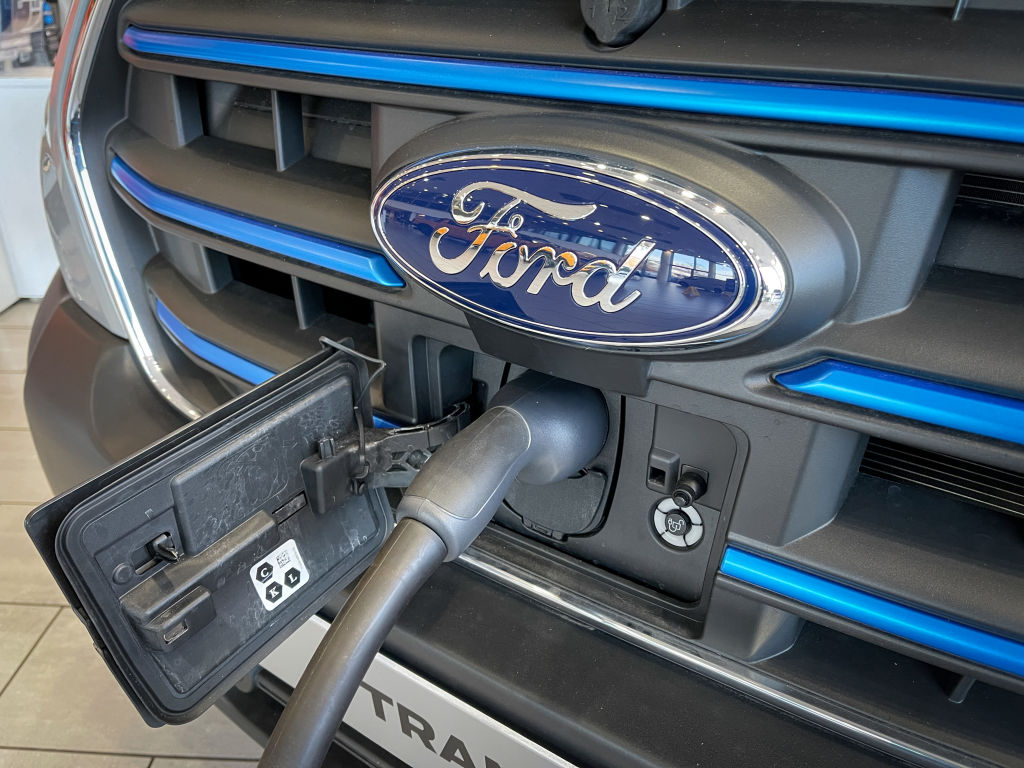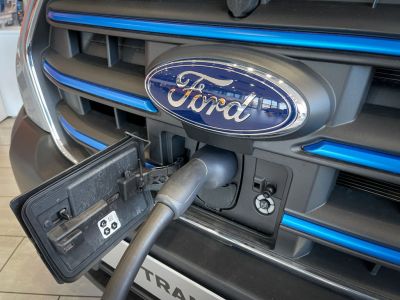Ford’s soon-to-be-built $3.5 billion electric battery factory looks tailor-made to qualify for new electric-vehicle tax credits Congress passed last year. Yet Ford is getting plenty of blowback, particularly from Republicans, because of its partnership with a Chinese manufacturer for the “knowledge and services” to run the plant.
At the center of the debate is a new consumer tax credit established by the Inflation Reduction Act of 2022. The tax cuts are meant to get Americans buying more domestically produced electric vehicles—and to decouple the U.S. from China in the EV industry, which China has dominated. The Inflation Reduction Act’s tax credit applies to most types of EVs that meet a set of criteria: final assembly has to take place in North America; 50 percent of battery components are produced or manufactured in North America; and 40 percent of the minerals used in creating the vehicle come from the United States or a country with which the United States has a free trade agreement. Vehicles that meet the first criterion and one of the latter two qualify for a $3,750 credit to the EV buyer, while vehicles that meet all three criteria earn a $7,500 tax credit.
Starting next year, vehicles with any battery component from an “entity of concern”—a group, individual, or nation that the government deems to be harming national security or American foreign policy objectives—will not qualify for the credit. China and companies affiliated with the Chinese government would be considered such entities.
The new Ford plant would satisfy the IRA’s requirements: Ford will own the plant, and it will be a Ford subsidiary that builds the batteries, not an “entity of concern” like a CCP-affiliated company.
Michigan Gov. Gretchen Whitmer praised the Ford plant coming to her state as a “big win.” Department of Energy Secretary Jennifer Granholm has said that the factory is “bringing advanced manufacturing capabilities from overseas to the United States is key to our competitiveness, will stimulate our economy, and create good-paying American jobs.”
But Contemporary Amperex Technology Company Limited (CATL), which is the biggest producer of EV batteries in the world, is giving Ford “knowledge and services” to run the plant according to Ford’s announcement. Some say Ford’s maneuvering amounts to sending tax dollars to China.
Ford has been cagey about what exactly CATL is being paid for and did not respond to a request for comment from The Dispatch. But Lisa Drake, Ford’s vice president of EV industrialization, told CNBC that Ford will license technology and technical expertise from CATL for the battery plant. Other Ford executives have publicly defended the move too. “CATL isn’t investing anything [in the Michigan factory] and will have no ownership or control of the plant. CATL will get only a licensing fee from Ford for the right to use battery-chemistry technology that’s owned by and only available from CATL,” Chief Government Affairs Officer Christopher Smith wrote in an op-ed.
In response, GOP Sen. Marco Rubio has proposed legislation to block tax credits for EVs that use technology from Chinese companies the way Smith describes.
“America cannot build a reliable, independent battery sector if our companies are partnering with Beijing’s national champion,” Rubio said in a statement shared with The Dispatch. “Allowing Chinese companies to benefit from state support in China and taxpayer dollars in the U.S. makes absolutely no sense. We cannot continue repeating the mistakes of the past by assuming these companies—controlled either directly or indirectly by the Chinese Communist Party—are working in good faith.” Rubio’s proposed bill, Restricting Electric Vehicle Outlays from Kleptomaniac Enemies (REVOKE) Act of 2023, was referred to the Committee on Finance on March 9, where it is still being considered.
Rubio also asked the Biden administration and the Committee on Foreign Investment in the United States to review Ford’s partnership with CATL but has received no response, his office said.
Another critic is Virginia Gov. Glenn Youngkin, who passed on the opportunity to have Ford’s new plant built in his state, referring to it as a “Trojan Horse” for China.
China’s state-controlled economy requires a great deal from domestic businesses. Data sharing, government aid to businesses willing to toe the Chinese Communist Party line, disappearing business leaders—the oversight the Chinese government has over private industry is such that Secretary of State Antony Blinken stated in an interview with CBS News that “in China, there’s really no distinction between private companies and the state.”
And Contemporary Amperex Technology Company Limited’s connection to the CCP goes further than just the baseline cost of doing business in China. With the geopolitical importance of the industry, the Chinese government has supported CATL as the company has grown, even going so far as to remove a safety test for EV batteries when it seemed CATL’s product would fail. The New York Times found that CATL investors had ties with the Chinese government, that state affiliated banks have loaned more than $100 million to CATL, and that the company has benefited from the Chinese government's requirement that foreign automakers selling EVs in China turn over intellectual property to a local government. The founder and chairman of CATL, Robin Zeng, is a member of the National Committee of the Chinese People’s Political Consultative Conference, the top political advisory body in China.
Ford’s Michigan plant is anticipated to open in 2026.







Please note that we at The Dispatch hold ourselves, our work, and our commenters to a higher standard than other places on the internet. We welcome comments that foster genuine debate or discussion—including comments critical of us or our work—but responses that include ad hominem attacks on fellow Dispatch members or are intended to stoke fear and anger may be moderated.
With your membership, you only have the ability to comment on The Morning Dispatch articles. Consider upgrading to join the conversation everywhere.